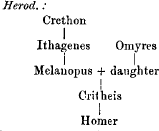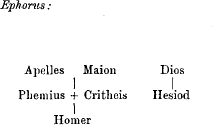No CrossRef data available.
Article contents
Extract
I shall not do injustice to the learning of my readers if I imagine that the lives of Homer are not their usual reading, their livre de chevet. They are seldom opened nowadays, unless some wandering folklorist plunders them for an Εἰρεσιώνη or a Κάμινος. Once they were part of the arsenal of learning. The editors of Homer from Chalcondylas to Ernesti printed them at the head of the poet, and herein only followed the Byzantine use. The Eastern Empire had the habit of amassing a considerable quantity of erudition—grammatical, metrical, exegetical, and also biographical—believed necessary for the comprehension of Homer, and arranging it at the beginning of a copy of the poems. Whether the later classical ages also had this habit we cannot tell, for no papyrus has been found to present the beginning of the Iliad or the Odyssey. It was in any case the latest period of classicism which so consulted the ease of a reader as to include his commentary with his author. The handbook existed, in post-Augustan days, but separately. Scholia of any compass have so far not been found in MSS. earlier than the minuscule era, and their origin appears to coincide very nearly with the act which marked the world's second childhood, the closing of the schools by Justinian.
- Type
- Research Article
- Information
- Copyright
- Copyright © The Society for the Promotion of Hellenic Studies 1912
References
1 Marini, vit. Procl. 25Google Scholarπαραγράψαντος [τοῦ πρόκλου] τοῖς μετωπίοις τῶν ὐπομνημάτων ἐγέ νετο εἰς Ορφέα αὐτῷ σχόλια καὶ ὐπομνήματα στίχων οὐκ ὀλίγων The word occurs, but not in the sense which we now give it, earlier in Porph., vit. Plot. 3Google Scholarσχόλια δὲ ἐκ τῶν συνουσιῶν ποιούμενος ἐκατόν που βιβλία συνέταξε τῶν σχολίων
2 Cf. Rohde, , Rh. Mus. 36Google Scholar. 413 (mainly on chronology).
3 Strabo 621 made it the original Aeolic settlement, earlier than Cyme.
4 Ephorus, fr. 22Google Scholar agrees in the Cymaean origin of Cebren.
5 This aera was chosen in character, as by Herodotus.
6 Hiller, Rh. Mus. 25Google Scholar. 253 holds that Cyril's chronological statements are taken from Eusebius.
7 

The occurrence of Crethon in the Herodotean stemma suggests Dinarchus (v. Part II.).
8 Κεφαλίων ἤ Κεφάλων Γεργίθιος καὶ ἰστορικός γεγονὼς ἐπὶ Αδριανοῦ ἔφυγε δὲ τὴν πατριδα δι απέχθειαν δυναστῶν καὶ ἐβίω ἐν Σικελις ἔγραψε παντοδοπὰς ἰστορίας ἐν βιβλίοις θ ἄτινα ἐπιγράφει Μούσας Ιάδι διαλέκτῳ μελέτας τε ῥητορικάς καὶ ἂλλα τινὰ The μελέται ῥητορικαὶ may cover the Life.
On Lobeck, Cephalion, Aglaoph. ii. 995Google Scholar may still be read.
9 How the author reconciled this epitaph, written for Midas' sons, with his date 168 or 160 years after the Troica, is not clear.
10 There is no difficulty in believing the reference to concern the original Agon and not our document. Rhetorical exercises by Gorgias and Alcidamas are still extant, and Tzetzes, Chil. xi. 750Google Scholar declares he had read ‘many’ of the latter's λόγοι.
11 F.H.G. ii. 16. Dated by Dion. Hal. as πρὸ τοῦ Πελοποννησιαλκοῦ πολέμου His ὦροι Σαμίων is to be noticed as an instance of one source of the tradition about Homer.
12 No independent notice of Callicles exists. He seems to have been a Cypriote, since his candidate as Homer's father Masagoras here is evidently the same as Dmasagoras favoured by Alexander, of Paphos (vit. vii. 2. 10)Google Scholar. If this is so he is the authority for the statement Cert. 30, that his father was given as a hostage by the Cyprians to the Persians. He made him a Salaminian, Cyprianvit. vi. 17Google Scholar. He was probably earlier than Antipater, (vit. Plut. i. 89Google Scholar).
13 Democritus of Troezen must disappear. Δημὁκριτος here is an error for the rarer name, which is preserved vit. vi. 28, schol. B 744.
14 Birt, , Das antike Buchwesen, p. 164Google Scholar. cf. first lines without figures in Anonymi vita Aristotelis Did. p. 14, ἔπη ὦν ἀρχὴ ἀγνὲ θεῶν πρέσ βυσθ᾿ ἐκατηβόλε ἐλεγεῖα ὦν ἀρχὴ καλλιτέχνων μητρὸς θύγατερ
15 e.g. Hermogenes, whose epitaph (C.I.G. ii. 1. 3311)Google Scholar says συνέγραυε δὲ βιβλὶα . . . . περὶ Ζμύρνης ά β´ περὶ τῆς ῾ Ομήρου σοφίας ά καὶ πατρίδος ά (Schrader, , Porph. qu. Il. p. 441Google Scholar), or Cassius Longinus (Suid. in v.), teacher of Porphyrius under Aurelian, who wrote several Homeric works.
16 Isocrates' words Panath. 18 = 236d may apply: . . . ἔλεγον ὠς ἐν τῷ Λυκείῳ συγκαθεζ ὀμενοι τρεῖς ἤ τέτταρες τῶμ ἀγελαίων σοφιστῶν καὶ πάντα φασκόντων εἰδέναι καὶ ταχέως πανταχοῦ γιγνομένων διαλέγοιντο περὶ τε τῶν ἄλλων ποιητῶν καὶ τῆς Ησιόδου καὶ τῆς Ομήρου ποιήσεωσ οὐδὲν μὲν παρ᾿ αὐτῶν λέγοντες τὰ δ᾿ ἐκείνων ῥαψῳδοῦντες καὶ τῶν πρότερον ἄλλοις τισὸν εἰρ νων τὰ κάλλιστα μνημονεύοντες
17 The Plutarchean μοῦσά μοι ἔννεπε κεῖνα defends the μοῦς ἄγε μοι of the Certamen, which has been misunderstood. The five lines are supposed to be the beginning of a poem, not a literal challenge to Homer. Σύ δ is the usual call to the Muse.
18 These conclusions were I believe reached independently. I see on reference that the idea of a poem of some antiquity as the source of the Certamen is countenanced by Bergk, , Gr. Litteraturgesch. i. 930Google Scholar, 931, Rohde, , Rh. Mus. 36Google Scholar, Meyer, Eduard, Hermes 27Google Scholar. 377.
19 I have enumerated some of them, ed. p. 239.
20 This mention of him, and that of Callimaclms as quoting the epitaph ἐνθάδε τὴν ίεράν (53) are peculiar to Vind. 39, in which the Suidean life is prefixed to the Iliad. Callimachus perhaps came through Charax, cf. his fr. 19.
21 Charax was extant A.D. 502, if Eustathius of Epiphania, (ap. Evag. v. 24Google Scholar, F.H.Q. iv. 138), whose history went down to that year, epitomised him.




